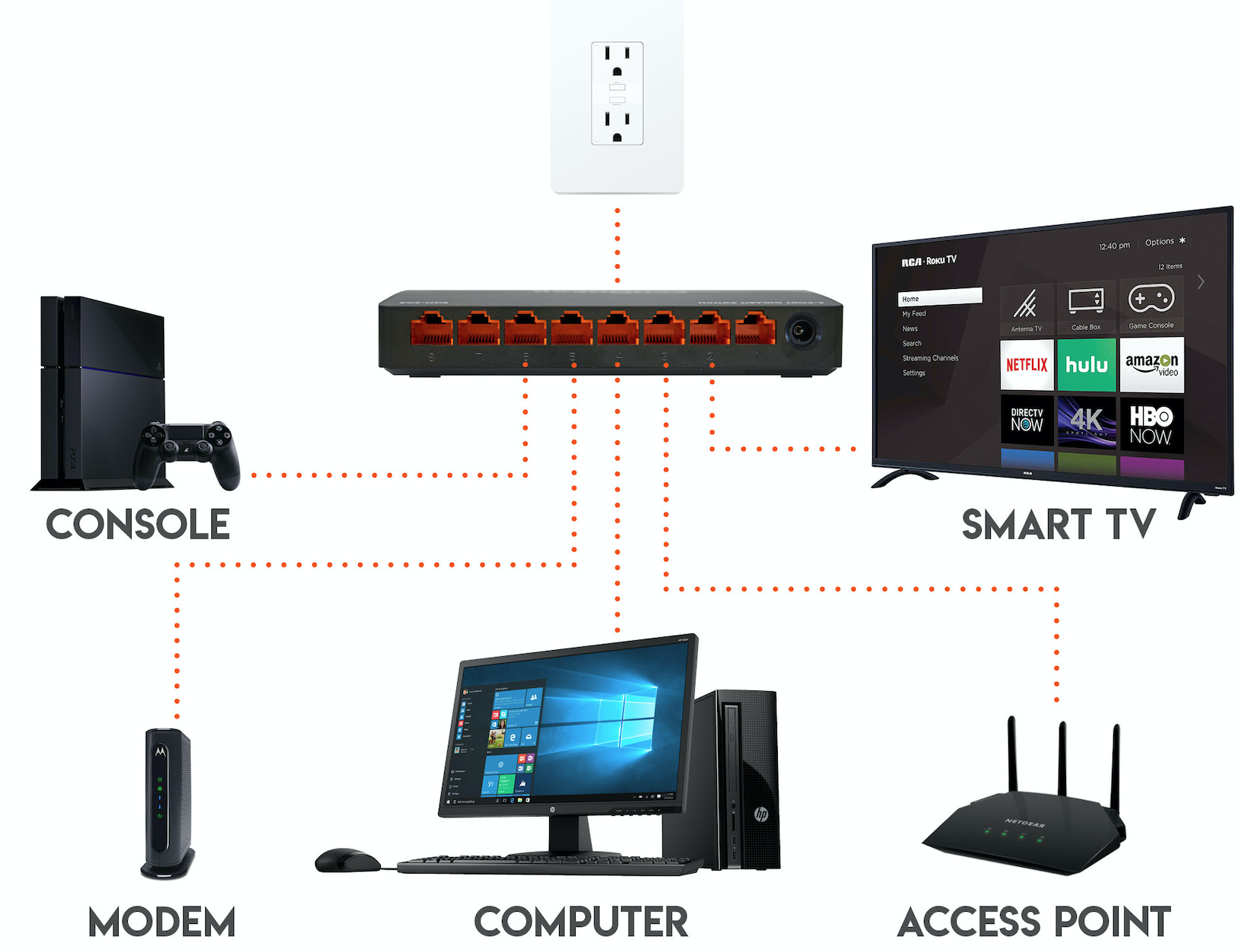Choosing the best network switch for your home is essential for seamless internet connectivity. A network switch helps to connect multiple devices, ensuring a smooth and reliable network.
In today’s digital world, having a stable and fast internet connection is crucial. Whether you’re working from home, streaming movies, or gaming, a good network switch can make a significant difference. It improves your network’s performance by efficiently managing data traffic. In today’s digital world, having a stable and fast internet connection is crucial as detailed here
With various options available, selecting the right switch can be overwhelming. This guide will help you understand the key features and benefits of the best network switches for home use. Get ready to enhance your home network and enjoy a better online experience.

Credit: www.echogear.com
Types Of Network Switches
Choosing the best network switch for home can be daunting. There are many types of network switches available. Understanding the differences helps make the right choice. Let’s explore the main types of network switches.
Unmanaged Switches
Unmanaged switches are simple to use. They do not need configuration. Perfect for small networks. They work straight out of the box. Plug and play convenience. No need for technical knowledge.
- Easy to set up
- Low cost
- Basic functionality
Ideal for connecting a few devices at home. For example, computers and printers. They provide a quick way to expand your network.
Managed Switches
Managed switches offer more control. They are more complex than unmanaged switches. They allow users to manage and configure the network. Ideal for larger home networks.
- Advanced features
- VLAN support
- Quality of Service (QoS)
Managed switches need technical knowledge. They provide tools for monitoring and troubleshooting. They are perfect for users who need more control over their network.
Smart Switches
Smart switches are in between unmanaged and managed switches. They offer some management features. Easier to use than managed switches. Ideal for users who need more than basic functionality.
- Web-based interface
- Limited VLAN support
- Basic QoS settings
Smart switches offer a balance. They provide more control than unmanaged switches. Less complexity than managed switches.
Choose the right network switch based on your needs. Whether you need simplicity or advanced features, there is a switch for you.
Key Features To Consider
Choosing the best network switch for your home requires understanding key features. Each feature plays a significant role in the overall performance of your network. Let’s delve into the essential features to consider.
Speed And Performance
Speed and performance are vital for a smooth network experience. A network switch with gigabit speeds ensures fast data transfer. This is crucial if you stream videos or play online games. Look for switches that offer low latency. This guarantees quick response times.
Number Of Ports
The number of ports determines how many devices you can connect. More ports mean more devices can connect simultaneously. A good home network switch should have at least five ports. This allows you to connect your computer, smart TV, gaming console, and more. Ensure the ports support the speed you need.
Power Over Ethernet (PoE)
Power over Ethernet (PoE) provides power and data through one cable. This is useful for devices like security cameras or VoIP phones. It reduces the need for extra power cables. Make sure the switch supports PoE if you plan to use PoE devices. This will simplify your setup and reduce clutter.
Top Network Switch Brands
Choosing the right network switch for your home can be overwhelming. With so many brands available, it’s important to know which ones stand out. Let’s explore the top network switch brands that offer reliability, performance, and ease of use.
Netgear
Netgear is a well-known name in the networking industry. They offer a range of switches suitable for home use. Netgear switches are known for their reliability and ease of installation.
- Easy to set up
- Durable build quality
- Various models to choose from
Popular models include the Netgear GS305 and GS308. These models provide fast performance and are perfect for small home networks.
Tp-link
TP-Link is another trusted brand for home network switches. They offer a variety of switches that are affordable and user-friendly.
- Cost-effective options
- Simple setup process
- Good customer support
TP-Link’s TL-SG105 and TL-SG108 are popular choices. These switches offer gigabit speeds and are ideal for enhancing home network performance.
Cisco
Cisco is a leader in networking solutions. Their home switches are known for high performance and advanced features.
- High-quality hardware
- Advanced security features
- Reliable performance
For home use, Cisco’s SG110D-08 and SG110-16 are great options. They provide robust performance and secure connections.
| Brand | Model | Features |
|---|---|---|
| Netgear | GS305 | 5 ports, gigabit speed, plug-and-play |
| Netgear | GS308 | 8 ports, gigabit speed, energy-efficient |
| TP-Link | TL-SG105 | 5 ports, gigabit speed, easy installation |
| TP-Link | TL-SG108 | 8 ports, gigabit speed, reliable performance |
| Cisco | SG110D-08 | 8 ports, gigabit speed, secure connections |
| Cisco | SG110-16 | 16 ports, gigabit speed, advanced features |
Each of these brands offers unique benefits. Whether you need a basic switch or one with advanced features, these brands have you covered.
Best Network Switches For Home Use
Choosing the right network switch for your home can enhance your internet experience. A good network switch helps you connect multiple devices seamlessly. Whether you need a budget-friendly option, a high-performance model, or the best switch for gaming, there’s something for everyone.
Budget-friendly Options
Not everyone wants to spend a lot on a network switch. Luckily, there are many affordable options. The TP-Link TL-SG105 is a great choice. It offers five-gigabit ports and works efficiently. Another reliable model is the NETGEAR GS308. It provides eight ports for larger setups. Both are easy to install and require no complex configurations. They ensure stable connections at a low cost.
High-performance Models
If you need more power, high-performance models are the way to go. The Cisco SG110D-08 offers robust performance with eight ports. It’s perfect for a busy home network. Another great option is the Ubiquiti UniFi Switch 8. This model is ideal for advanced users. It supports PoE (Power over Ethernet) and has a sleek design. Both models ensure fast data transfer and reliable performance.
Best For Gaming
Gamers need a network switch that reduces lag and boosts speed. The NETGEAR Nighthawk S8000 is a top choice. It features eight ports and advanced QoS (Quality of Service) controls. Another excellent option is the ASUS XG-U2008. It offers 10G ports for ultra-fast connections. Both switches provide a smooth gaming experience with minimal lag.
Setting Up Your Network Switch
Discover the best network switch for your home setup. Ensure smooth and fast internet connections for all your devices. Simplify your network management effortlessly.
Setting up a network switch in your home can seem complex. But it’s simpler than you think. Follow a few basic steps. You’ll soon enjoy a faster and more reliable home network.
Basic Installation Steps
First, choose a good location for your switch. It should be near your main router. It helps to keep cables short and tidy. Next, connect the network switch to your router. Use an Ethernet cable for this connection. Now, plug in other devices to the switch. Use additional Ethernet cables for this. Ensure all cables are secure. Finally, power on your network switch. Check the lights to ensure it’s working properly.
Optimizing Performance
To get the most from your network switch, take a few extra steps. Label each cable. It helps identify connections easily. Keep your switch in a cool, dry place. Overheating can cause performance issues. Regularly update the firmware of your switch. This keeps it running smoothly. Also, prioritize connections. Some devices need more bandwidth. Ensure they are connected to the fastest ports. Monitor your network. Look for any slowdowns or issues. Adjust settings as needed to keep everything running well.
“`

Credit: community.fs.com
Troubleshooting Common Issues
Even the best network switches for home can encounter issues. Understanding how to troubleshoot common problems can help maintain a smooth network experience. Below, we discuss some frequent issues and how to address them.
Connectivity Problems
Connectivity problems can be frustrating. When devices fail to connect, check the following:
- Ensure all cables are securely plugged in.
- Verify the network switch is powered on.
- Restart the network switch and devices.
- Check if the network cables are damaged. Replace if necessary.
If the issue persists, consider resetting the network switch to its factory settings. This often resolves more complex connectivity problems. Always back up your settings before performing a reset.
Slow Network Speeds
Experiencing slow network speeds can be a common issue. Here are steps to identify and resolve the problem:
- Run a speed test to determine your current network speed.
- Compare the results with your internet service plan.
- Check if multiple devices are using high-bandwidth applications. Limit their use if possible.
- Update firmware on the network switch and connected devices.
If the network speed remains slow, consider the following:
- Upgrade your network cables to Cat6 or higher.
- Check for any network interference from other electronic devices.
Sometimes, upgrading your network switch to one with a higher capacity can resolve persistent speed issues. Look for switches that support Gigabit speeds for optimal performance.

The Best Way to Set Up a Smart Home: A Complete Guide for 2024
Frequently Asked Questions
What Is The Best Network Switch For Home Use?
The best network switch for home use depends on your needs. Popular choices include TP-Link, Netgear, and Cisco. Look for features like gigabit speed, multiple ports, and easy setup.
How Many Ports Do I Need On A Home Network Switch?
The number of ports you need depends on your devices. Generally, 5 to 8 ports are enough. Consider future-proofing with more ports for new devices.
Are Managed Switches Better For Home Networks?
Managed switches offer more control and features. They are ideal for advanced users. For basic home use, unmanaged switches are simpler and sufficient.
Do I Need A Gigabit Switch For Home Use?
Yes, a gigabit switch is recommended. It ensures fast data transfer speeds. This is essential for streaming, gaming, and multiple device connections.
Conclusion
Choosing the best network switch for your home is important. It enhances connectivity and streamlines your devices. Look for switches with easy setup and reliable performance. Consider your budget and specific needs. A good network switch improves your internet experience.
Enjoy seamless streaming, faster downloads, and smooth online gaming. Remember, investing in quality network equipment pays off. Stay connected and enjoy a hassle-free digital life.









